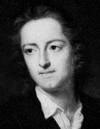- Gray, Thomas
-
born Dec. 26, 1716, London, Eng.died July 30, 1771, Cambridge, CambridgeshireBritish poet.He studied and later settled at Cambridge, where he wrote poems of wistful melancholy filled with truisms phrased in striking, quotable lines. Though his output was small, he became the dominant poetic figure in his day. He is remembered especially for "An Elegy Written in a Country Church Yard" (1751), one of the best known of English lyric poems and the greatest work of the English "graveyard school." After its overwhelming success, his next two poems met a disappointing response, and he virtually ceased writing.
 Thomas Gray, detail of an oil painting by John Giles Eccardt; in the National Portrait Gallery, ...Courtesy of The National Portrait Gallery, London
Thomas Gray, detail of an oil painting by John Giles Eccardt; in the National Portrait Gallery, ...Courtesy of The National Portrait Gallery, London* * *
▪ English poetborn Dec. 26, 1716, Londondied July 30, 1771, Cambridge, Cambridgeshire, Eng.English poet whose “An Elegy Written in a Country Church Yard” is one of the best known of English lyric poems. Although his literary output was slight, he was the dominant poetic figure in the mid-18th century and a precursor of the Romantic movement.Born into a prosperous but unhappy home, Gray was the sole survivor of 12 children of a harsh and violent father and a long-suffering mother, who operated a millinery business to educate him. A delicate and studious boy, he was sent to Eton in 1725 at the age of eight. There he formed a “Quadruple Alliance” with three other boys who liked poetry and classics and disliked rowdy sports and the Hogarthian manners of the period. They were Horace Walpole, the son of the prime minister; the precocious poet Richard West, who was closest to Gray; and Thomas Ashton. The style of life Gray developed at Eton, devoted to quiet study, the pleasures of the imagination, and a few understanding friends, was to persist for the rest of his years.In 1734 he entered Peterhouse, Cambridge, where he began to write Latin verse of considerable merit. He left in 1738 without a degree and set out in 1739 with Walpole on a grand tour of France, Switzerland, and Italy at Sir Robert Walpole's expense. At first all went well, but in 1741 they quarreled—possibly over Gray's preferences for museums and scenery to Walpole's interest in lighter social pursuits—and Gray returned to England. They were reconciled in 1745 on Walpole's initiative and remained somewhat cooler friends for the rest of their lives.In 1742 Gray settled at Cambridge. That same year West died, an event that affected him profoundly. Gray had begun to write English poems, among which some of the best were “Ode on the Spring,” “Sonnet on the Death of Mr. Richard West,” “Hymn to Adversity,” and “Ode on a Distant Prospect of Eton College.” They revealed his maturity, ease and felicity of expression, wistful melancholy, and the ability to phrase truisms in striking, quotable lines, such as “where ignorance is bliss, 'Tis folly to be wise.” The Eton ode was published in 1747 and again in 1748 along with “Ode on the Spring.” They attracted no attention.It was not until “An Elegy Written in a Country Church Yard,” a poem long in the making, was published in 1751 that Gray was recognized. Its success was instantaneous and overwhelming. A dignified elegy in eloquent classical diction celebrating the graves of humble and unknown villagers was, in itself, a novelty. Its theme that the lives of the rich and poor alike “lead but to the grave” was already familiar, but Gray's treatment—which had the effect of suggesting that it was not only the “rude forefathers of the village” he was mourning but the death of all men and of the poet himself—gave the poem its universal appeal. Gray's newfound celebrity did not make the slightest difference in his habits. He remained at Peterhouse until 1756, when, outraged by a prank played on him by students, he moved to Pembroke College. He wrote two Pindaric odes, “The Progress of Poesy” and “The Bard,” published in 1757 by Walpole's private Strawberry Hill Press. They were criticized, not without reason, for obscurity, and in disappointment, Gray virtually ceased to write. He was offered the laureateship in 1757 but declined it. He buried himself in his studies of Celtic and Scandinavian antiquities and became increasingly retiring and hypochondriacal. In his last years his peace was disrupted by his friendship with a young Swiss nobleman, Charles Victor de Bonstetten, for whom he conceived a romantic devotion, the most profound emotional experience of his life.Gray died at 55 and was buried in the country churchyard at Stoke Poges, Buckinghamshire, celebrated in his “Elegy.”* * *
Universalium. 2010.
